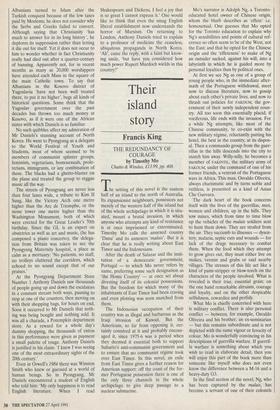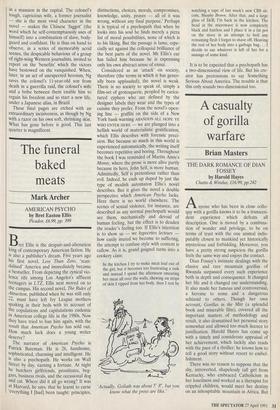Their island story
Francis King
THE REDUNDANCY OF COURAGE by Timothy Mo Chatto & Windus, £13.99, pp. 408 The setting of this novel is the eastern half of an island to the north of Australia. Its expansionist neighbourg, possessors not merely of the western half of the island but of the whole archipelago in which it is situ- ated, mount a brutal invasion, in which anyone who attempts any kind of resistance is at once imprisoned or exterminated. Timothy Mo calls the annexed country `Danu' and its annexers `malais'. But it is clear that he is really writing about East Timor and the Indonesians.
After the death of Salazar and the insti- tution of a democratic government, Portugal — to which Mo never refers by name, preferring some such designation as `the Home Country' — at once set about divesting itself of its colonial possessions. But the freedom for which many of the inhabitants of East Timor had been craving and even plotting was soon snatched from them.
The Indonesian occupation of their country was as illegal and barbarous as the Iraqi invasion of Kuwait. But the Americans, so far from opposing it, cer- tainly connived at it and probably encour- aged it, since 1975-6 was a period when they deemed it essential both to support Suharto's anti-communist government and to ensure that no communist regime took over East Timor. In this novel, an exile from East Timor gives a further reason for American support: off the coast of the for- mer Portuguese possession there is one of the only three channels in the whole archipelago to give deep passage to a nuclear submarine. Mo's narrator is Adolph Ng, a Toronto- educated hotel owner of Chinese origin, whom the blurb describes as 'effete' i.e. homosexual. One guesses that Mo opted for the Toronto education to explain why Ng's sensibilities and points of cultural ref- erence so often seem to be of the West, not the East; and that he opted for the Chinese origin and the 'effeteness' to make of Ng an outsider sucked, against his will, into a labyrinth in which he is guided more by personal loyalties than by political ones.
At first we see Ng as one of a group of young people who, in the immediate after- math of the Portuguese withdrawal, meet now to discuss literature, now to gossip about each other's private lives, and now to thrash out policies for FAKOUM, the gov- ernment of their newly independent coun- try. All too soon this essentially placid, if vociferous, life ends with the invasion. For a while Ng attempts, like most of the Chinese community, to co-exist with the new military regime, reluctantly putting his hotel, the best in the country, at its dispos- al. Then a commando group from the guer- rillas in the hills descends into the city to snatch him away. Willy-nilly, he becomes a member of FAKINTIL, the military army of FAKOUM, under the command of one of his former friends, a veteran of the Portuguese wars in Africa. This man, Osvaldo Oliveira, always charismatic and by turns noble and ruthless, is presented as a kind of Asian Che Guevara.
The dark heart of the book concerns itself with the lives of the guerrillas, men, women and children, up in the hills. They sow mines, which from time to time blow up the vehicles of the malais soldiers sent to hunt them down. They are strafed from the air. They succumb to illnesses — dysen- tery, malaria, septic cuts and wounds — for lack of the drugs necessary to combat them. When the food which they attempt to grow gives out, they must either live on snakes, vermin and grubs or raid nearby villages. The stresses of this life act like a kind of paint-stripper or blow-torch on the characters of the people involved. What is revealed is their true, essential grain: on the one hand remarkable altruism, courage and loyalty, and on the other despicable selfishness, cowardice and perfidy.
What Mo is chiefly concerned with here is military conflict. There is also personal conflict — between, for example, Osvaldo Oliveira and his brother, an ex-seminarian — but this remains subordinate and is not depicted with the same vigour or ferocity of colour. Mo is wonderfully convincing in his descriptions of guerrilla warfare. If guerril- la warfare is something about which you wish to read in elaborate detail, then you will enjoy this part of the book more than someone like myself who does not even know the difference between a M-16 and a heavy-duty G3.
In the final section of the novel, Ng, who has been captured by the malais, has become a servant of one of their colonels in a mansion in the capital. The colonel's tough, capricious wife, a former journalist — she is the most vivid character in the novel — makes the Chinese 'faggot' (the word which he self-contemptuously uses of himself) into a combination of slave, body- guard and confidant. He is thus on hand to observe, in a series of memorably acrid scenes, the despicable behaviour of a group of right-wing Western journalists, invited to report on the 'benefits' which the victors have bestowed on the vanquished. When, later, in an act of unexpected heroism, Ng saves the colonel's 11-year-old son from death in a guerrilla raid, the colonel's wife and a bribe between them enable him to regain his freedom and so start a new life, under a Japanese alias, in Brazil.
These final pages are etched with an extraordinary incisiveness, as though by Ng with a razor on his own soft, shrinking skin. What has gone before is good. This last quarter is magnificent.



















































 Previous page
Previous page